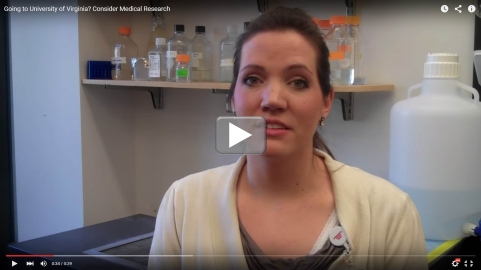LabTV: Curious about Pancreatic Cancer
Growing up in Blacksburg, VA, Lindsey Brinton was constantly asking her parents how everything worked. She took this expansive natural curiosity with her to the University of Virginia, where she earned undergraduate degrees in French literature and biomedical engineering. Now a Ph.D. candidate at UVA in the lab of Kimberly Kelly—and the subject of our latest LabTV video—Brinton is posing interesting questions about pancreatic cancer.
Pancreatic cancer is one of the most difficult cancers to treat, in part, because it often spreads early and is diagnosed too late. Brinton’s research is focused on the cells that surround the tumor, the so-called stroma, and on the risk of metastasis. She wonders whether these cells display unique targets on their surface that, once discovered, can be exploited to kill the tumor cells. It’s certainly challenging research. Failures far outnumber successes. But as Brinton points out, endurance, perseverance, and keeping your eye on the big picture can lead to success.
Her curiosity and positive perspective inform Brinton’s advice to those interested in a career in science. She says, “It’s important to … allow yourself many experiences in different fields in order to figure out one that you’re really passionate about.” Brinton speaks from experience, having worked as an undergrad in labs involved in systems biology and modeling traumatic injuries before turning to pancreatic cancer. She’s learned that, if passion is driving your research, it helps you overcome the challenges that research presents: “If you find what you’re passionate about, you’ll succeed.” Here’s wishing her every success!
Links:
Kelly Lab (University of Virginia, Charlottesville)
Science Careers (National Institute of General Medical Sciences/NIH)
Careers Blog (Office of Intramural Training/NIH)























.png)











No hay comentarios:
Publicar un comentario